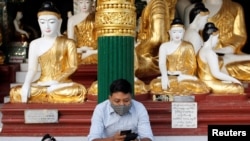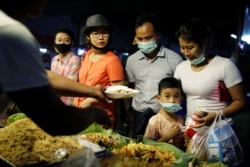Intent on preventing an outbreak of the coronavirus in Myanmar, local officials and members of ethnic armed organizations, or EAOs, along the border with China have imposed travel restrictions, increased health checks, called for monitoring of Chinese workers and, in some areas, imposed fines.
The border area — known for its rugged terrain beyond the government's control, enterprising smugglers, and long-simmering ethnic wars — concerns health authorities due to lax checkpoint controls.
The measures in Myanmar by both the government and EAOs are being enacted as the number of deaths continue to increase in China, where coronavirus 2019-nCoV was first identified in Wuhan, the capital of Hubei province.
According to the government, there are no confirmed cases or deaths in Myanmar. However, the swift spread of the not fully understood virus has alarmed many, leaving officials to quell rumors born of fear and long-held anti-Chinese sentiment.
Zaw Win, the social affairs minister of Myanmar's Sagaing region, told VOA Burmese on Thursday he had to contain widespread rumors of a coronavirus outbreak at a copper mine. That meant educating people that 34 Chinese workers there were under observation, not in quarantine. Health workers reported none of the Chinese mine workers had fevers, and none had been in Wuhan in the past 14 days.
The U.S. Centers for Disease Control and Prevention, or CDC, believes that symptoms of 2019-nCoV may appear in a person as few as two days or as long as 14 days after exposure to someone infected with the virus.
Win Htay, the Myanmar labor team leader at the Chinese-owned mine, Myanmar Yang Tse Copper Limited, told VOA on Thursday that 300 workers on his team decided to stay away and not share the job site with Chinese workers who might be contagious. The Myanmar workers also wanted assurances from the company that there was no truth to the rumor that a Chinese worker had died of the virus.
Dr. Thein Myo, chief health department officer in the Wynemaw district near the border with China, told VOA Burmese, "Kachin state health workers are on high alert to monitor incoming Chinese for not only 14 days, but also closely watching … the Chinese community."
Dr. Myint Kyaw, the health department chief of eastern Shan state, told VOA Burmese, "All health workers in my jurisdiction [are] to follow WHO (World Health Organization) guidelines to monitor Chinese entering to Myanmar and report back." WHO guidelines for prevention include the instruction to wash hands frequently.
The containment effort includes a public awareness campaign launched by the KIA-Kachin Armed Group, one of the largest anti-government EAOs.
Colonel Naw Bu, its spokesperson, told VOA the EAO was also monitoring people passing through the territory it controls along the border with China.
"There are no suspected cases in our territory, not even people with similar symptoms," he said. "We follow WHO guidelines for public awareness. For example, use a mask, do not hold public assemblies, take care of personal hygiene. We use multi-media — TV, radio and social media — to advocate to the public to be aware of coronavirus."
U Nyi Yang, spokesman for the United Wa State Party (UWSA)-Wa Autonomous Region, posted on Facebook earlier this week that the EAO had deployed health workers at checkpoints along the border with China.
Officials in the Shan state regions controlled by the EAO, the Myanmar National Democratic Alliance Army (MNDAA), and in the Mong Lar Special Region, both areas outside control of the Myanmar government, imposed travel restrictions and banned the trade in wildlife along the border with China. Early in the outbreak, many patients in Wuhan had some link to a large seafood and live animal market selling wild animals. That suggested the coronavirus spread from animals to people, but person-to-person transmission has since been reported, according to the CDC.
A statement from officials in Myanmar's autonomous Mong Lar Special Region in Shan state said that travelers without health certificates would be fined from $28,565 to $71,412 and detained for 30 days.







